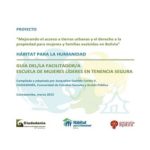Proceedings of the CPWF, GBDC, WLE Conference on Revitalizing the Ganges Coastal Zone: Turning Science into Policy and Practices, Dhaka, Bangladesh, 21-23 October 2014
Empowering Women and Ethnic Minority Groups to Collectively Market non Timber Forest Products from Community Forests in Cameroon
Women’s Experiences On Food Security In Kenya: Major Challenges That They Face
This paper discusses the major challenges women in Kenya face as they try to ensure and maintain food security at the household level. The challenges include access to and ownership of resources such as land, finance, water and affordable cooking energy; access to markets and proper infrastructure and
Social capital, conflict, and adaptive collaborative governance : Exploring the dialectic
Previously lineal and centralized natural resource management and development paradigms have shifted toward the recognition of complexity and dynamism of social-ecological systems, and toward more adaptive, decentralized, and collaborative models. However, certain messy and surprising dynamics remain under-recognized, including the inherent interplay between conflict, social capital, and governance. In this study we consider the dynamic intersections of these three often (seemingly) disparate phenomena.
Examining gender inequalities in land rights indicators in Asia
This paper reviews the available data on men’s and women’s land rights, identifies what can and cannot be measured by these data, and uses these measures to assess the gaps in the land rights of women and men. Building on the conceptual framework developed in 2014 by Doss et al., we utilize nationally representative individual- and plot-level data from Bangladesh, Tajikistan, Vietnam, and Timor-Leste to calculate five indicators: incidence of ownership by sex; distribution of ownership by sex; and distribution of plots, mean plot size, and distribution of land area, all by sex of owner.
Gender and Land Statistics. Recent developments in FAO’s Gender and Land Rights Database
Although there is global consensus that women’s land rights are fundamental for the realization of food security and rural development, accurate and reliable statistics to monitor the attainment and realisation of these rights are still lacking. Indeed, the lack of clear and accurate statistics on landownership and land management– that are disaggregated by sex - is problematic for developing clear policy responses to, and for monitoring of, inequalities faced by women and men in rural areas.
Mejorando el acceso a tierras urbanas y el derecho a la propiedad para mujeres y familias excluidas en Bolivia
Este documento contiene una propuesta que te servirá para conducir una escuela dirigida a fortalecer las capacidades de mujeres que luchan por la tenencia segura de la tierra y la vivienda urbanas.
Who Is Mama Ardhi?
While the guarantees provided in the Katiba mark an extraordinary achievement for women’s land rights, many more steps are needed to reach gender-equitable land ownership in Tanzania. Mama Ardhi members therefore continue to advocate for additional changes in policy and practice that will bring about real transformation for women, their children and society as a whole.
Proceedings of the Workshop on “Women’s Land Rights in India in the Context of the SDGs”
This is the proceedings of a Workshop organized at India International Center, Lodi Road, New Delhi, India by Center for Land Governance, NRMC, Bhubaneswar with the support of The World Bank, New Delhi. In this workshop, the study team shared the state and district-wise WLR maps segregated across caste and economic categories along with temporal trend. Usefulness and relevance of Agriculture Census data, Status of women pattwaris, Inter-state variations around women’s land rights parameters, Operational holdings and tenancy were discussed by the participating experts.






